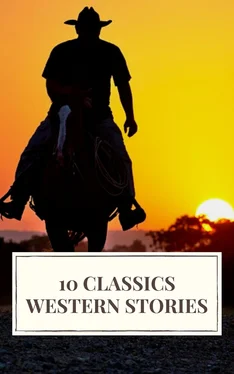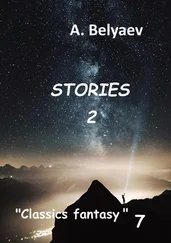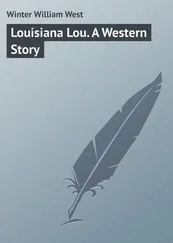Wherever there was opportunity, he stopped and talked, scattering seed-thoughts in the dark minds of the Indians. Wherever he paused a crowd would gather; whenever he entered a wigwam a throng collected at the door.
Let us glance for a moment into the domestic life of the Indians as Cecil saw it that morning.
He enters one of the large bark huts of the Willamette Indians, a long, low building, capable of sheltering sixty or seventy persons. The part around the door is painted to represent a man’s face, and the entrance is through the mouth. Within, he finds a spacious room perhaps eighty or a hundred feet long by twenty wide, with rows of rude bunks rising tier above tier on either side. In the centre are the stones and ashes of the hearth; above is an aperture in the roof for the escape of smoke; around the hearth mats are spread to sit upon; the bare ground, hard and trodden, forms the only floor, and the roof is made of boards that have been split out with mallet and wedges.
Cecil enters and stands a moment in silence; then the head of the house advances and welcomes him. The best mat is spread for him to sit upon; food is brought,—pounded fish, nuts, and berries, and a kind of bread made of roots cooked, crushed together, and cut in slices when cold. All this is served on a wooden platter, and he must eat whether hungry or not; for to refuse would be the grossest affront that could be offered a Willamette host, especially if it were presented by his own hands. The highest honor that a western Oregon Indian could do his guest was to wait on him instead of letting his squaw do it. The Indian host stands beside Cecil and says, in good-humored hospitality, “Eat, eat much,” nor is he quite pleased if he thinks that his visitor slights the offered food. When the guest can be no longer persuaded to eat more, the food is removed, the platter is washed in water, and dried with a wisp of twisted grass; a small treasure of tobacco is produced from a little buckskin pocket and a part of it carefully mixed with dried leaves; [10]the pipe is filled and smoked. Then, and not till then, may the Indian host listen to the talk of the white man.
So it was in lodge after lodge; he must first eat, be it ever so little. Two centuries later, the Methodist and Congregational missionaries found themselves confronted with the same oppressive hospitality among the Rocky Mountain Indians. [11]Nay, they need not visit a wigwam; let them but stroll abroad through the village, and if they were popular and the camp was well supplied with buffalo-meat, messengers would come with appalling frequency, bearing the laconic invitation, “Come and eat;” and the missionary must go, or give offence, even though he had already gone to half a dozen wigwams on the same errand. There is a grim humor in a missionary’s eating fresh buffalo-meat in the cause of religion until he is like to burst, and yet heroically going forth to choke down a few mouthfuls more, lest he offend some dusky convert.
At one house Cecil witnessed a painful yet comical scene. The Willamettes were polygamists, each brave having as many wives as he was able to buy; and Cecil was in a lodge where the brother of the head man of that lodge brought home his second wife. At the entrance of the second wife, all gay in Indian finery, the first did not manifest the sisterly spirit proper for the occasion. After sitting awhile in sullen silence, she arose and began to kick the fire about, accompanying that performance with gutteral exclamations addressed to no one in particular; she struck the dog, which chanced to be in the way, sending it yelping from the wigwam; and then, having worked herself into a rage, began to scold her husband, who listened grimly but said nothing. At last she turned on her new-found sister, struck her, and began to lay rending hands on the finery that their mutual husband had given her. That was instantly resented; and in a few moments the squaws were rolling on the floor, biting, scratching, and pulling each other’s hair with the fury of devils incarnate. The dogs, attracted by the tumult, ran in and began to bark at them; the Indians outside the hut gathered at the door, looking in and laughing; the husband contemplated them as they rolled fighting at his feet, and then looked at Cecil. It was undoubtedly trying to Indian dignity but the warrior sustained his admirably. “Bad, very bad,” was the only comment he allowed himself to make. Cecil took his leave, and the brave kept up his air of indifference until the white man had gone. Then he quietly selected a cudgel from the heap of fire-wood by the doorway, and in a short time peace reigned in the wigwam.
In a lodge not far away, Cecil witnessed another scene yet more barbarous than this. He found a little blind boy sitting on the ground near the fire, surrounded by a quantity of fish-bones which he had been picking. He was made a subject for the taunting jibes and laughter of a number of men and women squatting around him. His mother sat by in the most cruel apathy and unconcern, and only smiled when Cecil expressed commiseration for her unfortunate and peculiarly unhappy child. It had been neglected and seemed almost starved. Those around apparently took pleasure in tormenting it and rendering it miserable, and vied with each other in applying to it insulting and degrading epithets. The little articles that Cecil gave to it, in the hope that the Indians seeing him manifest an interest in it would treat it more tenderly, it put to its mouth eagerly; but not finding them eatable, it threw them aside in disgust. Cecil turned away sick at heart. Worn, already weary, this last sight was intolerable; and he went out into the woods, away from the camp.
But as he walked along he seemed to see the child again, so vividly had it impressed his imagination. It rose before him in the wood, when the noise of the camp lay far behind; it seemed to turn its sightless eyes upon him and reach out its emaciated arms as if appealing for help. [12]
Out in the wood he came across an Indian sitting on a log, his face buried in his hands, his attitude indicating sickness or despondency. He looked up as Cecil approached. It was the young Willamette runner who had been his companion on the journey down the Columbia. His face was haggard; he was evidently very sick. The missionary stopped and tried to talk with him, but could evoke little response, except that he did not want to talk, and that he wanted to be left alone. He seemed so moody and irritable that Cecil thought it best to leave him. His experience was that talking with a sick Indian was very much like stirring up a wounded rattlesnake. So he left the runner and went on into the forest, seeking the solitude without which he could scarcely have lived amid the degrading barbarism around him. His spirit required frequent communion with God and Nature, else he would have died of weariness and sickness of heart.
Wandering listlessly, he went on further and further from the camp, never dreaming of what lay before him, or of the wild sweet destiny to which that dim Indian trail was leading him through the shadowy wood.
Chapter 2 THE WHITE WOMAN IN THE WOOD.
I seek a sail that never looms from out the purple haze
At rosy dawn, or fading eve, or in the noontide’s blaze.
Celia Thaxter.
Cecil walked listlessly on through the wood. He was worn out by the day’s efforts, though it was as yet but the middle of the afternoon. There was a feeling of exhaustion in his lungs, a fluttering pain about his heart, the result of years of over-work upon a delicate frame. With this feeling of physical weakness came always the fear that his strength might give way ere his work was done. Nor was this all. In these times of depression, the longing to see again the faces of his friends, to have again the sweet graceful things of the life that was forever closed to him, rushed over him in a bitter flood.
Читать дальше












